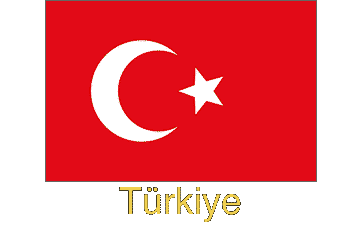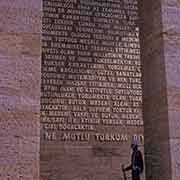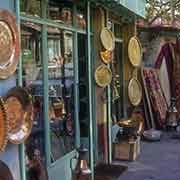Photos of Ankara, capital of Turkey, Turkey
Ankara, capital of Turkey
Ankara is the capital of the Turkish Republic, established on 29 October 1923. It is now the second-largest city, after İstanbul, the former imperial capital. Situated in the centre of Anatolia, in one of the driest parts of Turkey, it is considered a green city, having plenty of green areas for its almost 5 million inhabitants.
you may then send it as a postcard if you wish.
Ankara is an ancient city. The area was inhabited in the Bronze Age by the Hattian peoples, who gradually were absorbed by the Indo-European Hittites in 2000-1700 BCE. Around Ankara are archeological sites going back to Hittites, Phrygians and Greeks. The latter arrived here around 300 BCE and developed the city as a trading centre. In 278 BCE the city and surroundings were occupied by the Galatians, a Celtic group: Ankara, then known as Ancyra, became one of their main tribal centres. It became part of the Roman Empire, and in 25 BCE Emperor Augustus made it the capital city of the Roman province of Galatia. Ancyra housed about 200,000 people during the heyday of the Roman Empire. In the 3rd Century CE however, it was invaded by Goths and later by Arabs, but reincorporated in the Roman Empire in 272.
During the time of the Byzantine Empire, it was a centre of Christianity, but suffered from occupation by Sassanid Persians and Arabs, both in the 7th Century. The Seljuks Turks captured Ancyra in 1073, although a few years later Crusaders handed it back to Byzantine rule; the Seljuks of Rum in 1143, however, retook it. Exactly a century later the Mongols defeated the Seljuks, and the city became a Mongol dominion. In 1356 it was captured by an Ottoman force, only to be lost to the Mongols in 1402, but a year later, in 1403, Ankara was for good under Ottoman control.
The Ottomans were defeated in World War I and on 10 August 1920 the Treaty of Sèvres was signed between the Allies and the Ottoman Empire. The Treaty stipulated the dismemberment of the Empire, with the loss of all non-Turkish territory to Armenia, France, Greece, Italy and the United Kingdom. The leader of the Turkish nationalist movement, Mustafa Kemal (later named Atatürk), had established the headquarters of his resistance movement in Ankara in 1920. The Turkish War of Independence was fought under his command against the Allies and won. The Treaty of Sèvres was annulled, and Ankara declared the capital of the Turkish Republic.
The oldest part of Ankara is the citadel, whose foundations were laid by the Celtic Galatians. The vast mausoleum of Kemal Atatürk, Anıtkabir, was completed in 1953 after nine years of construction, on a hill called Rasattepe (Observation Hill).














